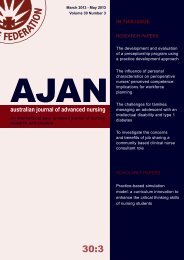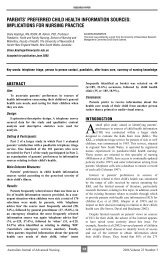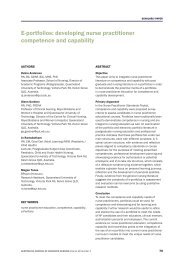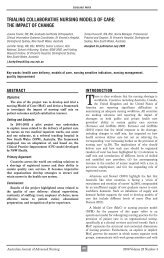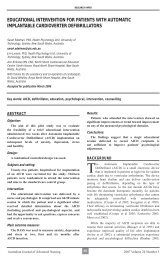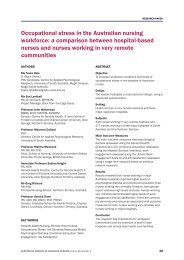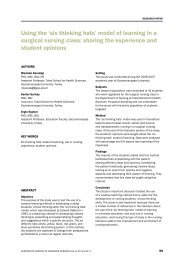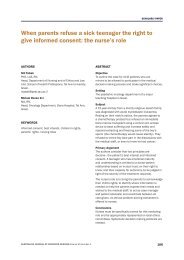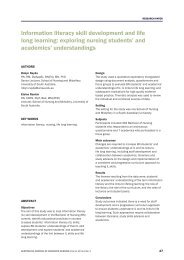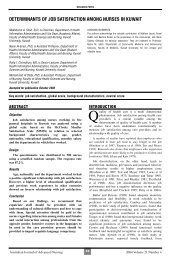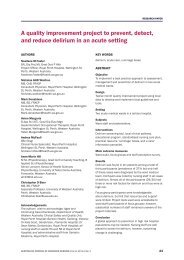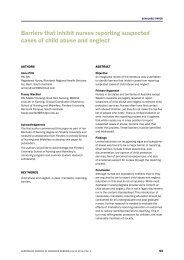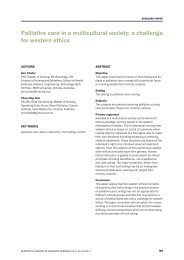australian journal of advanced nursing
australian journal of advanced nursing
australian journal of advanced nursing
You also want an ePaper? Increase the reach of your titles
YUMPU automatically turns print PDFs into web optimized ePapers that Google loves.
affect female fertility and providing counselling and<br />
support has been shown to decrease the time taken<br />
to conceive (Terzioglu 2001; Domar et al 2000).<br />
The results <strong>of</strong> this study indicate that both men and<br />
women believe stress may impact on their fertility, but<br />
although counselling is available free <strong>of</strong> charge in the<br />
clinic none <strong>of</strong> these patients attended counselling.<br />
This is typical <strong>of</strong> the clinic from which this sample<br />
is drawn, where it appears as if only a minority <strong>of</strong><br />
couples seeks psychological assistance.<br />
Alcohol consumption has been associated with<br />
reduced fertility but it is unclear what level <strong>of</strong><br />
alcohol is significant (Mukherjee et al 2005; Hakim<br />
et al 1998). Participants were concerned about the<br />
potential effects <strong>of</strong> alcohol consumption, with more<br />
than half <strong>of</strong> the sample indicating they thought alcohol<br />
would adversely affect the chance <strong>of</strong> conceiving.<br />
This belief was reflected in their actions, with most<br />
drinking only small amounts <strong>of</strong> alcohol or not at all.<br />
In South Australia the risks <strong>of</strong> alcohol consumption<br />
during pregnancy are well publicised (Womens and<br />
Childrens 2004) and other adverse effects associated<br />
with heavy drinking are also widely recognised (Zhang<br />
et al 2007; Ripabelli et al 2006; Anonomyous 2001),<br />
so recognition <strong>of</strong> a connection between alcohol and<br />
fertility could be expected.<br />
The consumption <strong>of</strong> caffeine has been associated<br />
with increased time taken to conceive (Bolumar<br />
et al 1997; Wilcox et al 1988) and increased risk<br />
<strong>of</strong> spontaneous abortion (Cnattingius et al 2000),<br />
although not all studies have found an association<br />
(Hakim et al 1998). Less than half <strong>of</strong> the participants<br />
in this study thought that caffeine consumption was<br />
highly influential to the chance <strong>of</strong> conceiving, however<br />
most consumed only small quantities (one to two<br />
cups) <strong>of</strong> c<strong>of</strong>fee per day.<br />
Most participants ate a healthy diet, said they were<br />
physically fit and thought the connection between<br />
fertility and these factors was associated with<br />
general health and well being rather than a more<br />
specific connection. The benefits <strong>of</strong> a healthy diet<br />
and regular exercise are well known and this was<br />
reinforced by the responses <strong>of</strong> participants in this<br />
study. With regard to over the counter supplements,<br />
SCHOLARLY PAPER<br />
participants’ belief and actions were disparate. Four<br />
couples said it was unnecessary to take additional<br />
supplements if eating a healthy diet, however all<br />
females and most males (eight) were taking some<br />
type <strong>of</strong> supplement. Various supplements were used,<br />
the most common being women’s multi vitamins (six<br />
females). Three participants (two females and one<br />
male) were taking a mix <strong>of</strong> herbs put together by a<br />
naturopath and none knew the specific ingredients<br />
<strong>of</strong> theses mixtures. This is a similar finding to a<br />
recent South Australian survey <strong>of</strong> 97 new patients<br />
attending a clinic for fertility treatment, where 78%<br />
<strong>of</strong> those taking complementary medicines were<br />
using over‑the‑counter multi vitamins (Stankiewicz<br />
et al 2007). The use <strong>of</strong> Complementary medicine<br />
is widespread in America (Berman and Chesney<br />
2005) and Australia (Xue et al 2007; MacLennan<br />
et al 2006) and this trend extends to the infertile<br />
population (Stankiewicz et al 2007). The popularity<br />
<strong>of</strong> supplements may be explained by the stress <strong>of</strong><br />
continued infertility and the desire to take unproven<br />
and sometimes irrational measures. Further research<br />
is required regarding the reasons behind this practice.<br />
It is noteworthy that, given the effectiveness <strong>of</strong><br />
reducing the risk <strong>of</strong> neural tube defects by taking a<br />
daily dose <strong>of</strong> folic acid (Wani 2000), only half <strong>of</strong> the<br />
females in this study were taking folic acid. Similar<br />
results were found in a recent Australian study <strong>of</strong><br />
588 pregnant women, where only 23% had taken<br />
folic acid prior to pregnancy (Forster et al 2009).<br />
This is well below the target that all women planning<br />
pregnancy should consume 0.4‑0.5mg <strong>of</strong> folic acid<br />
per day for three months prior to pregnancy.<br />
Limitations <strong>of</strong> this study include the small sample size<br />
and the well known difficulties with self reporting <strong>of</strong><br />
behaviours such as alcohol consumption. The budget<br />
limited the opportunity to broaden the numbers <strong>of</strong><br />
couples interviewed and the objective assessment<br />
<strong>of</strong> lifestyle factors such as alcohol consumption, diet<br />
and physical fitness.<br />
While most males and females wanted to make<br />
lifestyle changes there were frequent barriers. In<br />
order to potentiate effective changes individuals<br />
should first be in an appropriate psychological<br />
AUSTRALIAN JOURNAL OF ADVANCED NURSING Volume 26 Number 4 83



